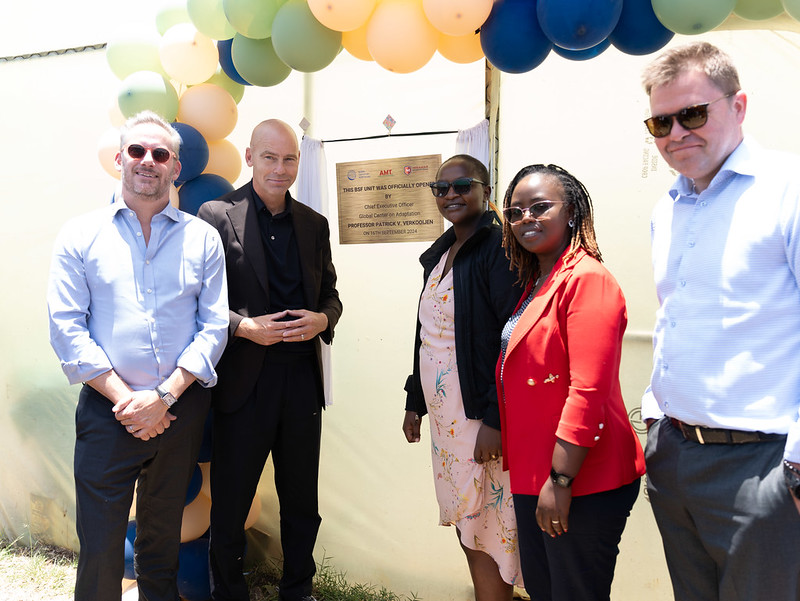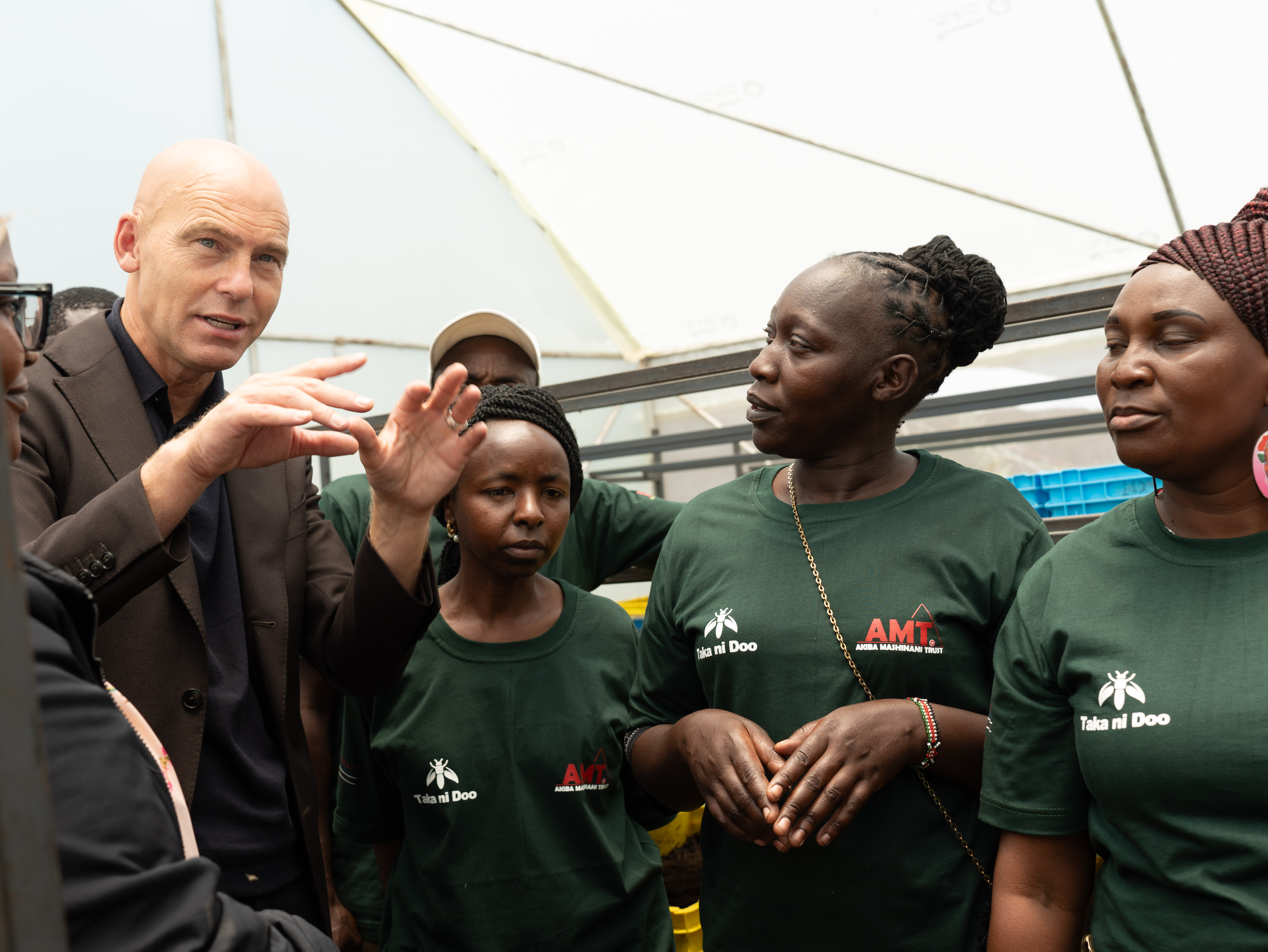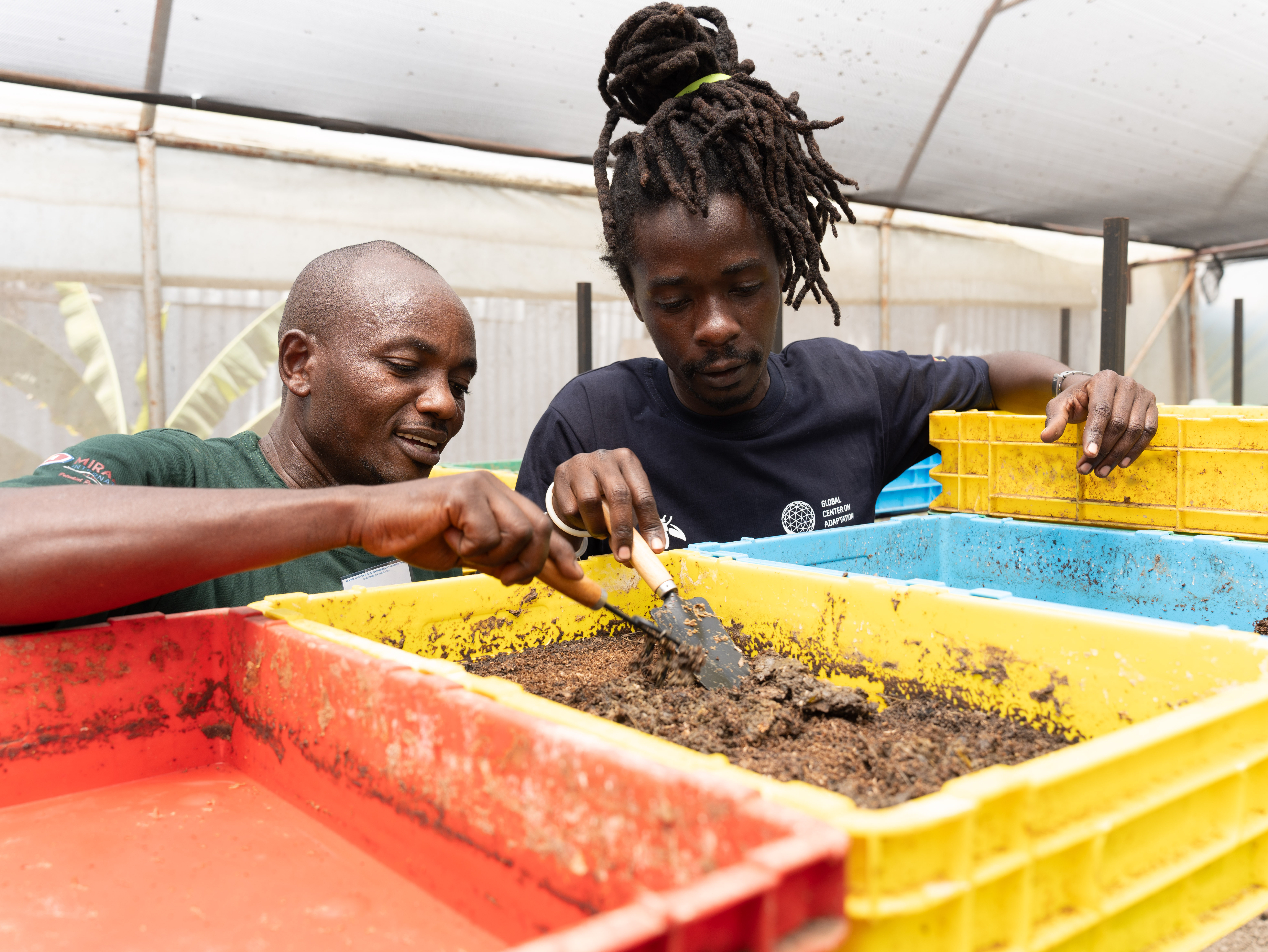The Global Center on Adaptation (GCA) marked a significant milestone in climate adaptation, sustainable urban development, and green jobs with the inauguration of 12 Black Soldier Fly (BSF) units in Mukuru, Nairobi today. The initiative, undertaken through the Africa Adaptation Acceleration Program (AAAP) in partnership with the African Development Bank (AfDB), DanChurchAid, and local partners Akiba Mashinani Trust (AMT) and Miramar Foundation, is set to revolutionize waste management in one of Nairobi's largest informal settlements while providing employment opportunities for young people by equipping them with skills in sustainable agriculture, waste management, and business management.
The BSF units process organic waste into two valuable byproducts: protein-rich larvae for livestock feed and nutrient-rich organic fertilizer. The removal of the organic waste in the settlement, which lacks formal waste collection services, mitigates flooding (by preventing blockages in drainage systems), contamination of water sources, and the spread of vector and water borne diseases. The initiative also promotes sustainability by reducing reliance on traditional waste disposal methods like landfilling or incineration, which contribute to greenhouse gas emissions and environmental degradation. The 12 units are expected to process 72 tons of organic waste per month, contributing significantly to climate resilience efforts in the settlement.

The official inauguration by GCA CEO Prof. Patrick Verkooijen.
During the Fourth AAAP Partnership Forum held the same week in Nairobi, 65 young people who have successfully completed a three-month certified training program in BSF farming and business management were presented with certificates. A further 35 are currently enrolled. These youth are trained to operate the BSF units and market the livestock feed and fertilizer, increasing their earning potential by up to 26 times compared to simply collecting and disposing household waste, as is the practice currently. The initiative aims to expand to other informal settlements across Africa, providing both adaptation and economic benefits.
The BSF units are part of a broader community-driven strategy linked to the Mukuru People’s Adaptation Plan, which aims to enhance resilience in a settlement whose residents are acutely vulnerable to climate change. The project builds on GCA's role as a transmission belt connecting international financial institutions with community-led solutions and technical expertise to address climate risks to the poorest and most vulnerable.
Two community members discuss the BSF project.
GCA CEO Professor Patrick V. Verkooijen underscored the initiative's importance for Africa’s adaptation to climate change: "The Black Soldier Fly initiative in Mukuru demonstrates the power of locally led climate solutions and their upskilling and job creation opportunities.” He highlighted how this initiative is “turning waste into wealth” while empowering youth with skills. “We are addressing multiple challenges head-on—from flood and disease mitigation to youth employment and food security. This is exactly the kind of scalable, innovative initiative that we are linking to development finance institutions with, to scale up and accelerate adaptation across Africa under the Africa Adaptation Acceleration Program,” Professor Verkooijen added.

Prof. Patrick Verkooijen visits the BSF units with community members.
AMT Director Jane Weru described the project as a model for future climate adaptation efforts: "This initiative is not only solving the problem of waste management but is also transforming the lives of our youth by equipping them with skills that will enable them to lead in green entrepreneurship. Mukuru is setting an example for Nairobi and other cities across Africa, showing that climate adaptation can be both locally driven and globally impactful."

Community members tend to the BSF units.
Together with the community representatives of Mukuru, the inauguration ceremony of the initiative also saw participation from key international stakeholders, including representatives from France and Norway, who reiterated their support for the AAAP. As Africa looks to rapidly accelerate its adaptation efforts, this BSF initiative offers a compelling model for how informal urban settlements can lead the charge in building climate resilience.
Notes to Editors
About the Africa Adaptation Acceleration Program (AAAP)
The Africa Adaptation Acceleration Program (AAAP) is a joint initiative by the African Development Bank and the Global Center on Adaptation, aimed at mobilizing $25 billion over five years to scale up climate adaptation in Africa. Since its launch, the AAAP has integrated climate adaptation measures into over $10 billion in investments, helping to build climate resilience for millions across the continent.
About the Global Center on Adaptation
The Global Center on Adaptation (GCA) is an international organization that promotes adaptation to the impacts of climate change. It works to climate-proof development by instigating policy reforms and influencing investments made by international financial institutions and the private sector. The goal is to bring climate adaptation to the forefront of the global fight against climate change and ensure that it remains prominent.
Founded in 2018, GCA embodies innovation in its approach to climate adaptation as well as in its physical presence. It operates from the largest floating office in the world, in Rotterdam, the Netherlands. GCA has a worldwide network of regional offices in Abidjan, Côte d’Ivoire; Dhaka, Bangladesh; and Beijing, China. The Center will open a new office in Nairobi, Kenya in 2025.